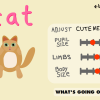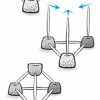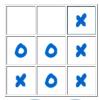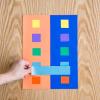Search Results
Showing results 41 to 60 of 114

Hoopster: An Airplane Made from Paper Hoops
Source Institutions
This activity provides instructions for making an aircraft that can really fly using a straw and paper hoops!

Make Your Own Rain Stick
Source Institutions
This activity provides step-by-step instructions on how to build a rain stick, a musical instrument originating in South America.

Yeast-Air Balloons
Source Institutions
In this activity, learners make a yeast-air balloon to get a better idea of what yeast can do. Learners discover that the purpose of leaveners like yeast is to produce the gas that makes bread rise.

Thread the Needle: Using Two Eyes Gives You Depth Perception
Source Institutions
Closing one eye eliminates one of the clues that your brain uses to judge depth. Trying to perform a simple task with one eye closed demonstrates how much you rely on your depth perception.

Cafe Wall Illusion
Source Institutions
In this fun and interactive online exhibit, the straight lines of a tile wall appear to curve. The learner moves the rows of tiles and changes the color of the grout to achieve the intriguing effect.

Bubble Bomb
Source Institutions
Learn about chemical reactions by making a Bubble Bomb, a plastic bag you can pop with the power of fizz.

Colored Shadows
Source Institutions
In this optics activity, learners discover that not all shadows are black. Learners explore human color perception by using colored lights to make additive color mixtures.

Pictures From Light
Source Institutions
Did you know that using a lens one can bend light to make pictures of the world? It's true!

Cutify: What Makes for Cute?
Source Institutions
In this online activity exploring our perception of "cuteness," learners adjust various factors (like pupil size or length of limbs) on a face, a cat, and a hammer.

Bubbularium: See the Colors in Bubbles
Source Institutions
With little more than a flashlight, a straw, and a plastic lid, make an observatory so you can see the amazing colors in bubbles.

Geodesic Gumdrops: Candy and Toothpick Architecture
Source Institutions
This hands-on activity shows you how to build basic architectural shapes out of toothpicks and gumdrops.

Glitter Globe
Source Institutions
This activity shows learners (with adult supervision) how to make a Glitter Globe, a fabulous toy that shimmers when you shake it.

Tic-Tac-Toe
Source Institutions
In this online version of the classic paper and pencil game, learners practice looking ahead to anticipate an opponent's move.

Color Contrast
Source Institutions
Do you have a hard time matching paint swatches with your furniture? When you consider human perception, color is context dependent.

Magnetic Shielding: Magnetic lines stop here
Source Institutions
Testing magnets is always a fun pastime, but here, we're going beyond "will it attract the magnet?" In this activity, learners will investigate which materials allow magnetic fields to pass through or

Proprioception: Wiggle where you're at
Source Institutions
We're told from a young age that we have 5 senses, but we have many more. One of which is our awareness of our own body part's orientation and position.

Michelle O (formerly Vanna)
Source Institutions
We don't normally view people upside down and so our brains aren't accustomed to it.

Circles or Ovals?
Source Institutions
This science activity demonstrates the dominant eye phenomena. What does your brain do when it sees two images that conflict?

Squirming Palm
Source Institutions
Known as the waterfall effect, this activity demonstrates adaptation in our visual system.

